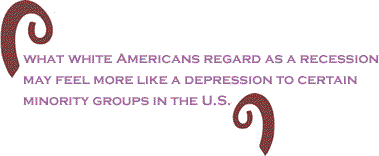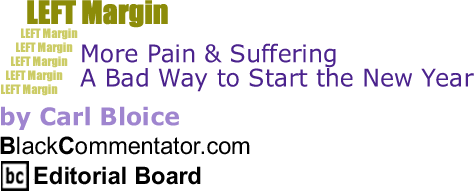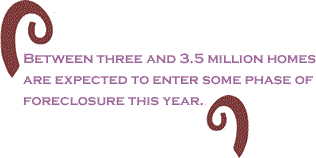
|
||||||||||||||||||||||
|
||||
 |
||||
| The reason they�ve taken to the airwaves in January to offer you three suits for the price of one is they couldn�t sell them in December. Before the real statistics were released, the people who predict these things had pointed to an over-the-mouth increase in sales but, when all was said and done, the fall in retail sales for 2009 was the largest yearly decline on record.
Just as rising unemployment and economic insecurity means less retail spending and fewer trips to the malls and showrooms, it also means a fall in available jobs. Rising joblessness means the already catastrophe situation in the housing market gets even worse. Last November over 92,000 homes were seized by the banks - up 19 percent from a year previous. In December, more than 349,000 households, or one in every 366 homes, were hit with foreclosure-related notices - up 15 percent from December 2008. According to the Associated Press, �A record 2.8 million households were threatened with foreclosure last year, and that number is expected to rise this year as more unemployed and cash-strapped homeowners fall behind on their mortgages. �Instead of declining, the number of foreclosed homes in the U.S. last year increased to a record 2.8 million, a 21 percent rise over 2008 and 120 percent over 2007, according to a new report from Irvine (Calif.)-based RealtyTrac. 2010 may not be much better.� Between three and 3.5 million homes are expected to enter some phase of foreclosure this year RealtyTrac, told AP.
It is now projected that 2.2 million people who took out mortgages to buy homes between 1998 and 2006 could lose their houses. African American and Latino homeowners are twice as likely to count in that number (one in 10) than white borrowers (one in 25). As the year began data was released showing that 1.41 million personal bankruptcy petitions were filed last year, up 32 percent from 2008. That�s more than 1 percent of all US households. There were 113,274 filings in December, up one third from December 2008. Each month of the year those filing for personal bankruptcy numbered over 100,000 However, it is the soaring jobless rate that is most telling of the impact of the recession on minority communities and its long term consequences. The government now says there were 444,000 jobless benefit claims filed in the week that ended January 9, up 11,000 from 433,000 the previous week. While the overall unemployment rate is 10 percent, African Americans experienced a December jump in unemployment to 16.2 percent from 15.6 percent in November and 12.1 percent one year ago. The rate for Latinos stands at 12.9, up from 12.7 in November. The teenage unemployment rate rose to 27.1 percent in December from 26.8 in November and 20.8 in 2008. Among black teenagers the unemployment rate stood at 48.4 percent. As 2009 came to a close the jobless rate for young African Americans� (now 26.4 percent) had risen 4.8 percentage points annually since the start of the economic downturn. The rate for young Latinos had risen 4.7 percentage points per year to 17.2 percent As Forbes magazine put it, unemployment for African Americans, Latinos and Asian is �skyrocketing.� The unemployment rate for African Americans and Latinos is increasing faster than for the rest of society. Some of the figures are astounding. Citing a new report by the Economic Policy Institute, Forbes staff writer Asher Edwards wrote last week that what �white Americans regard as a recession may feel more like a depression to certain minority groups in the U.S.� While the disparity in jobless rates along racial lines is nothing new, what is noteworthy is the degree to which in some areas the gap is increasing. The disproportionate nature of the increases in joblessness is most severe in some states. According to EPI analyst Kai Filion, while the jobless rate for white people in Alabama has risen 5 percent since the economic downturn began in 2007, the figure is 12.7 percent for African Americans. It is now 8 percent for whites and 18 percent for black Alabamans. In Nevada, the economic downturn jobless rate for whites went from 4.4 percent to 10.6 percent and for Latinos from 6.7 percent to 20.1 percent. The EPI says unemployment for African Americans nationwide could reach a 25-year high this year, soaring to 17.2 percent and the rates in five states exceeding 20 percent. The jobless rate for African Americans is projected to reach 27 percent in Michigan, which has been shedding auto industry jobs. Other states with jobless rates expected to soon rise above 20 percent for black workers are Alabama, Illinois, Ohio and South Carolina. The rate for Hispanics is projected to reach 22.2 percent in Nevada, reflecting a falloff in construction activity.
�The recession that began at the end of 2007 has produced enormous hardships for households across the country, and it has exacerbated structural problems already in place for minorities,� said Luke Reidenbach and Christian Weller of the Center for American Progress in a report issued on Martin Luther King Day. �The labor market has been particularly brutal, with high unemployment and job losses disproportionally affecting African Americans and Hispanics. The disparities between minorities and white Americans have persisted, and in some cases expanded. Many economic gains made in the previous economic expansion have been erased during the current downturn.� "Asian Americans are also hurting in this recession, despite historically faring better in the labor market,� the two researchers say. �Limited data masks diversity within the Asian-American community, making it difficult to gauge the effects of the recession on distinctly different ethnic groups. But the existing data show clear structural economic disparities in the American economy, both in times of economic growth and economic decline.� The unemployment rate for Asians has more than doubled since the recession began, going from 3.7 percent to 7.7 percent.
BlackCommentator.com Editorial Board member Carl Bloice is a writer in San Francisco, a member of the National Coordinating Committee of the Committees of Correspondence for Democracy and Socialism and formerly worked for a healthcare union. Click here to contact Mr. Bloice. |
||||
 |
||||
If you would like to comment on this article, please do so below. There is a 400 character limit. You do not need a FaceBook account. Your comment will be posted here on BC instantly. Thanks. Entering your email address is not mandatory. You may also choose to enter only your first name and your location.
|
||||
Thank you very much for your readership. |
||||
| Any BlackCommentator.com article may be re-printed so long as it is re-printed in its entirety and full credit given to the author and www.BlackCommentator.com. If the re-print is on the Internet we additionally request a link back to the original piece on our Website. | ||||
| |
||||
Issue 359 |
| Executive Editor: Bill Fletcher, Jr. |
| Managing Editor: Nancy Littlefield |
| Publisher: Peter Gamble |
| Est. April 5, 2002 |
| Printer Friendly Version in resizeable plain text format |
 |
 |
 |

|
 |
| |
| |












































